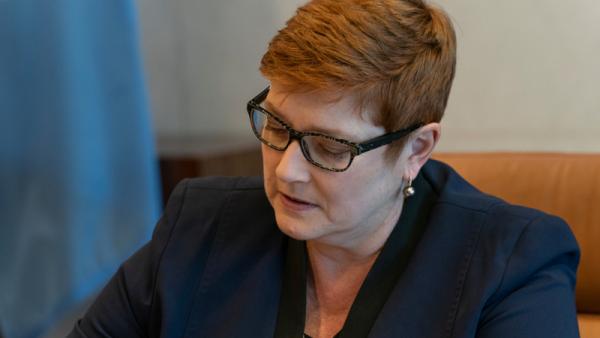lev radin / Shutterstock

James Laurenceson, Director, Australia-China Relations Institute, University of Technology Sydney |

Elena Collinson, Senior Project and Research Officer, Australia-China Relations Institute, University of Technology Sydney |
This article appeared in Network 10’s 10 daily on May 1 2020.
On April 19, the Australian government called for an international, independent inquiry into the origins and spread of COVID-19, as well as the initial response by the World Health Organization.
Given the devastating costs locally, in terms of lives and livelihoods, most Australians would expect nothing less from their government.
It is also consistent with Prime Minister Scott Morrison’s stated foreign policy approach: Australia may not be a superpower but we won’t just be sitting here awaiting our fate as bigger countries push their interests.
Australia’s call has been met with sharp resistance from the Chinese Foreign Ministry, which has tried to frame Australia’s proposal as a politically motivated manoeuvre taking its cue from the US. On April 21 the Chinese embassy in Australia said, ‘Certain Australian politicians are keen to parrot what those Americans have asserted and simply follow them in staging political attacks on China’.
On April 26 China ratcheted up its response further, with Chinese Ambassador Cheng Jingye in an interview with an Australian journalist hinting at economic retaliation, targeting education, wine and beef exports, if Canberra proceeded with its call for an inquiry.
This diplomatic grenade was immediately followed by yet another salvo, with the Chinese embassy breaching diplomatic protocol by publishing a purported account of a phone call between its ambassador and Frances Adamson, the head of the Australian government’s Department of Foreign Affairs and Trade.
In turn, the Chinese embassy alleged that it was forced to ‘reciprocate’ because the Australian side had played ‘petty tricks’ by leaking details of the call to media first.
Much of what is coming from China misunderstands Australia’s motive and intent, potentially even deliberately.
Saying that Australia is merely having its strings pulled by an American puppet master is a tired trope regularly trotted out by Chinese government officials.
But there’s ample evidence it isn’t true. The US ambassador in Canberra is unlikely to have been happy when Prime Minister Morrison told a talk show host on March 20, ‘The country which has actually been responsible for a large number of these [COVID-19 infections in Australia] has actually turned out to be the United States’.
And even hinting at economic punishment undermines China’s calls for Australia to work towards ‘enhancing mutual trust and cooperation’. It suggests that Beijing will only be content if Australia acts in the way China wants us to. That’s not a call for trust, it is a call for obedience.
At the same time, some of the reaction in Australia to the Chinese ambassador’s comments has been panicked.
A transcript of the interview with the Australian journalist shows that before the ambassador said the Chinese public may turn away from Australian products, he not once, but twice, batted away questions about the ‘consequences’ for Australia.
As such, the Australian journalist only felt appropriate to describe the comments as a ‘warning’, not a ‘threat’.
And even if a ‘threat’ was intended, there is limited reason to think China would act on it. Back in 2018, there were similar fears that a Chinese government led consumer boycott was in train. But later that year, trade data pointed to increased Chinese demand, and with one Australian China correspondent remarking that, ‘The nightmare scenario envisaged by Australian businesses in China of a backlash against their imports or operations failed to materialise’.
There are many reasons why Beijing might be reluctant to pull the retaliation trigger. One was acknowledged by China’s consul-general in Perth last year, ‘[W]e also depend on Australia in a way in terms of our resource security’.
Back in 2018, Frances Adamson made it clear that ‘the [Australian] government cannot be in a position to tolerate the exercise of coercion’. This time around, the Foreign Minister, Marise Payne, has delivered the same message. This is the right approach. To bend would only invite further pressure.
But this doesn’t mean that Australia can throw diplomatic caution to the wind. The reality is that the US and China are engaged in a monumental geopolitical spat and some frenzied accusations are being hurled from both sides of the Pacific.
Australia’s interests are likely better served by distancing itself from a Trump administration that has been inept in its own handling of COVID-19's spread and that sees bashing our biggest trading partner as its best hope of winning a US federal election in November.
And even after the US federal election, pragmatism and working with partners -- not a ‘go it alone’ attitude infused with anti-communist fervour -- has long been the basis of Australia’s success on the global stage.
A serious diplomatic option would have been to first assemble a like-minded coalition of countries calling for an international inquiry.
But the sudden push by Australia -- morally right though it might have been -- could have provoked an overly defensive Chinese response and made what Canberra actually wanted to achieve more difficult.
An Australian Nobel Prize-winner in Physiology or Medicine, Professor Peter Doherty -- not exactly a political actor or mouthpiece of the Chinese Communist Party -- has made this point.
Given today’s interconnected world, and the potential for a repeat of a similarly devastating pandemic in future, Australia’s push for transparency isn’t about singling China out for blame and punishment. It is about ensuring the benefits the bilateral relationship has brought to date are sustainable into the longer-term.
Authors
Professor James Laurenceson is Director of the Australia-China Relations Institute at the University of Technology Sydney.
Elena Collinson is a senior researcher at the Australia-China Relations Institute, University of Technology Sydney.


